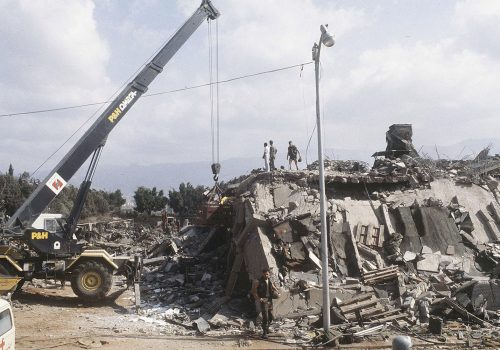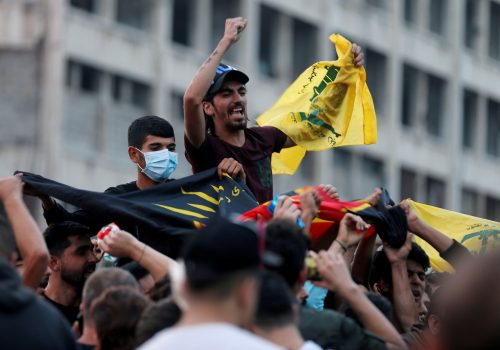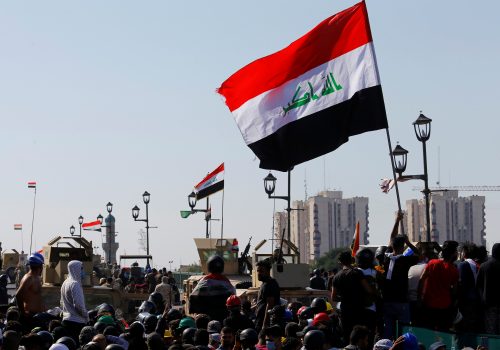Revolution in Lebanon
The peaceful protests sweeping Lebanon are revolutionary. Lebanese of multiple political persuasions and all sects have a powerful message for a political class whose incompetence is equaled only by its corruption: Go Away.
To date the principal defender of this abysmal political class and Lebanon’s miserable status quo (featuring a failing economy from which the political elite steals at will) has been Iran’s man in Lebanon, Hezbollah’s Secretary-General Hassan Nasrallah. Not only are thousands of his young constituents participating in the protests, but Nasrallah knows one thing with absolute certainty: his ability to act with impunity as the terrorist, money laundering, drug running, murder incorporated representative of Iran in Lebanon depends on Lebanese politics staying in the sewer. He wants the protests to end and has dispatched thugs to deliver the message.
In its essence Lebanon is a surviving fragment of the Ottoman Empire, modified nearly a century ago by France, which elevated Maronite Catholics over Sunni Muslims as most-favored sect. As it was in the empire, feudalism and sectarianism reigned: real indigenous political power resided in the hands of feudalists—some traditional and some nouveau—and religious authorities.
When Lebanon achieved independence in 1943, political sectarianism—instead of modern statehood—was enshrined in an unwritten “National Pact” arrived at by the Maronite-Sunni political elite, one keeping the country independent of the West and of Syria, while dividing up senior positions in a weak central government on the basis of sect. But real power remained local, in the hands of feudalists ruling predominantly single-sect constituencies.
Indeed, the absence of a sultan (after the French departure) was a notable difference from the Ottoman model. Lebanon’s first two presidents—Bishara al-Khoury and Camille Chamoun—tried to seize this role, but were blocked by the feudalists. The latter’s overreach produced the 1958 civil war and the subsequent attempt by Lebanon’s new president—General Fouad Chehab—to build a modern state through the country’s only multi-sectarian organization: the army. But the feudalists stopped battling one just another long enough to block Chehab’s efforts and to elect one of their most notorious fellows to the presidency in 1970.
Although Lebanon’s Shi’a Muslims (denied official status by the Ottomans) were included in the National Pact’s division of governmental spoils, the areas in which they lived were largely denied governmental services. Deprivation induced the Shi’a south to welcome Palestinian fighters in the late 1960s, a development leading to a brutal civil war, an Israeli invasion, and Iran’s successful capitalization of Lebanese Shi’a discontent through the creation of Hezbollah.
To the extent a state exists within Lebanese territory it is in those areas ruled by Nasrallah and his entourage. Yes, it is a state that places itself enthusiastically within Iran’s orbit. Yes, it is a state whose assassins have murdered prominent Lebanese, include former Prime Minister Rafik Hariri. Yes, it is a state that gratuitously prompted a destructive war with Israel in 2006 and today defies the policy of Lebanon’s Potemkin ‘national’ government by participating militarily in Syria’s internal conflict. Unlike the faux state, however, Hezbollahstan seeks to provide for the general material welfare of its citizenry.
Unlike the faux state, however, Hezbollahstan seeks to provide for the general material welfare of its citizenry
Nasrallah has, in effect, told the Lebanese feudalists and their retainers the following: ‘In return for you leaving me alone and ignoring pertinent United Nations resolutions about disarming illegal militias, I will let you accept bribes and steal what you wish.’ But as subsidies from Iran have dried up, the emptiness of this corrupt arrangement has become plain to many of Nasrallah’s constituents: especially to young Shi’a women and men whose opportunities for advancement in Lebanon are no brighter than those of young Lebanese belong to the other seventeen sects officially recognized by the Ottomanist relic.
Indeed, all young Lebanese are victimized by the rotten deal between Nasrallah and the feudal establishment. Bottomless corruption has blighted economic growth and even prevented the so-called state from collecting and disposing of rubbish properly. Attempts to raise taxes are viewed, quite understandably, as pick-pocketing. The results are to prompt many of the best and the brightest to leave Lebanon and to inspire prayers for an early departure by those lacking a ready means of escape.
The United States and a handful of other countries—France, Canada, the United Kingdom, and Australia come immediately to mind—could literally empty Lebanon instantly of its most talented and industrious young people. Indeed, Lebanese-Americans have been among the most productive and patriotic of Americans for generations. But these days, a leaderless, demoralized West wallows in anti-immigrant sentiment, denying itself the proven benefits of importing productive, ambitious human capital.
Yet even if the West were to reverse its destructive self-absorption, young Lebanese are no longer content to settle for a one-way ticket out. They want a state and a government that works for them and enables them to stay at home; one based on rulers deriving their political authority from the consent of the ruled. Although Lebanon has long claimed membership in the family of democracies and has permitted a much freer media than those found elsewhere in the Arab world, young Lebanese must go through the traditional political class or Nasrallah to make their cases for change and reform. And neither the feudalists nor Nasrallah have any interest at all in hearing, much less fulfilling, their demands. The last thing Hassan Nasrallah wants is a Lebanese system based on the consent of the governed. This is what would produce his one-way ticket out; likely to Tehran.
Washington should make clear its support for Lebanon’s popular, youth-driven revolution. Security assistance for Lebanon’s only national institution—the armed forces—should be restored immediately, accompanied with an understanding that the armed forces will refrain from harming peaceful protestors. The suspension of military assistance is a serious, unforced error, one telling many Lebanese that the United States is an unreliable partner. The United States and its allies should work inside Lebanon to support nonsectarian initiatives focused on civil society and political party building. Washington’s silence and malpractice to date has not prevented Nasrallah from accusing it of orchestrating this popular uprising. If the Trump administration is going to hang in Hezbollah’s kangaroo court, it may as well do something to earn the sentence.
Lebanon’s popular revolution may not succeed in 2019, or anytime soon. Indeed, the “Arab Spring” of 2011 has, to date, produced something approximating political legitimacy only in Tunisia. But the Arab world’s greatest resource—its deep reservoir of talented, industrious, and entrepreneurial young people—will not permanently be denied. Iran and Saudi Arabia—geopolitical rivals on one level—will together do all they can to suppress consent of the governed in the Middle East. They will not, in the end, succeed; not in Lebanon or anywhere else.
Ambassador Frederic C. Hof is Bard College’s Diplomat in Residence and a Distinguished Senior Fellow at the Atlantic Council.
Related Reads
Image: People demonstrate on the ‘Noor’ (or Light) square (with writing ‘Allah’ or God in the middle) in Tripoli, Lebanon on November 9, 2019, on the twenty-third day of protests again government and corruption of political leaders. Photo by Ammar Abd Rabbo/ABACAPRESS.COMNo Use France Digital. No Use France Print.


